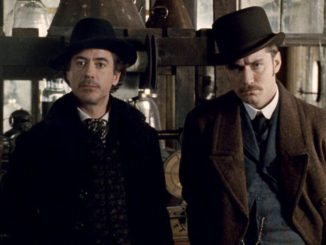 Movie tough guy Jason Statham owes his career to British director Guy Ritchie, who featured the fledgling actor in his first two features – Lock, Stock And Two Smoking Barrels (1998) and Snatch (2000). Critical and audience reactions to both their work on those films was strong enough that the two soon found themselves besieged with work offers. The newly released Wrath Of Man marks the first time that the two have worked together since 2005’s Revolver, but unfortunately the reunion is not up to the level of their previous collaborations.
Movie tough guy Jason Statham owes his career to British director Guy Ritchie, who featured the fledgling actor in his first two features – Lock, Stock And Two Smoking Barrels (1998) and Snatch (2000). Critical and audience reactions to both their work on those films was strong enough that the two soon found themselves besieged with work offers. The newly released Wrath Of Man marks the first time that the two have worked together since 2005’s Revolver, but unfortunately the reunion is not up to the level of their previous collaborations.
Statham plays a man who seems barely qualified for his new job working as a guard for an armored car car company. Nicknamed “H” by his new colleagues, he quickly proves his worth when he takes down a gang attempting to rob the armored car he is riding in on his first time out. But what his colleagues don’t know is that H has a specific reason for taking this job, to find and kill the team of armored car hijackers who killed his son in a hijacking several months earlier.
If you’re looking for the more expected stylized visuals typical of Ritchie, Wrath Of Man is bound to disappoint. Instead of his trademark camera swoops, speed ramps and slow motion photography, his camera is much more restrained, more traditional in terms of its set ups and how he covers his action sequences. H is a direct, brutal man and Ritchie’s shooting of this film in some ways matches that vibe – direct and without any real subtlety.
It turns out that the structuring of the screenplay, by Ritchie and his The Gentlemen scripting collaborators Ivan Atkinson and Marn Davies, is the real culprit here. The script starts off focused on H as he gets his job at the armored truck company and proving his deadly worth in stopping an armed robbery on his first day. It then flashes back five months to his son’s death and its aftermath. Then it flips to the point of view of the armored car hijackers and tells their story from before their first heist which killed H’s son all the way through the planning of what they hope will be their final big score.
The problem with the way the screenplay concentrates its time with the hijackers is that it keeps us away from H and his quest for vengeance for a substantial amount of time. That time away serves to disconnect us from his character. And while the time spent with the hijackers fills in their portion of the story, it does little to actually make us at least a small bit sympathetic to why their were in the armored car robbery business. If it had, then maybe the final third of the film would have at least a bit of dramatic tension, with the audience simultaneously hoping that H gets his revenge but maybe also hoping that the hijackers get away with their big heist. Instead the film just plays out to its forgone conclusion with little to no surprises or rising narrative energy to involve us.
Ritchie is not stranger to bouncing around the timeline of his narratives and I do appreciate that he tries to do so on a bigger scale here. However, it just doesn’t work and distracts from the overall dramatic thrust of H’s revenge, much to the film’s overall detriment.





